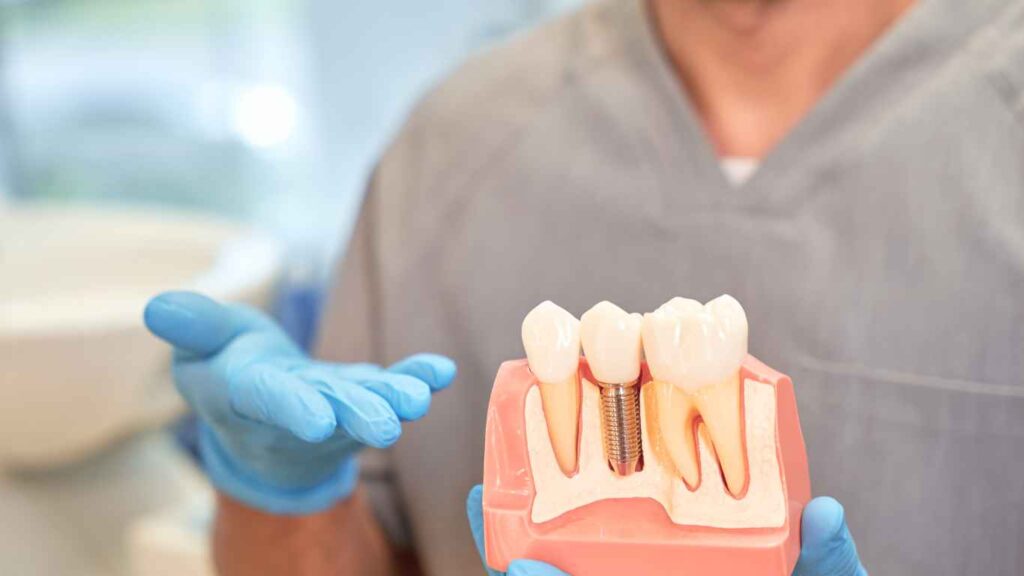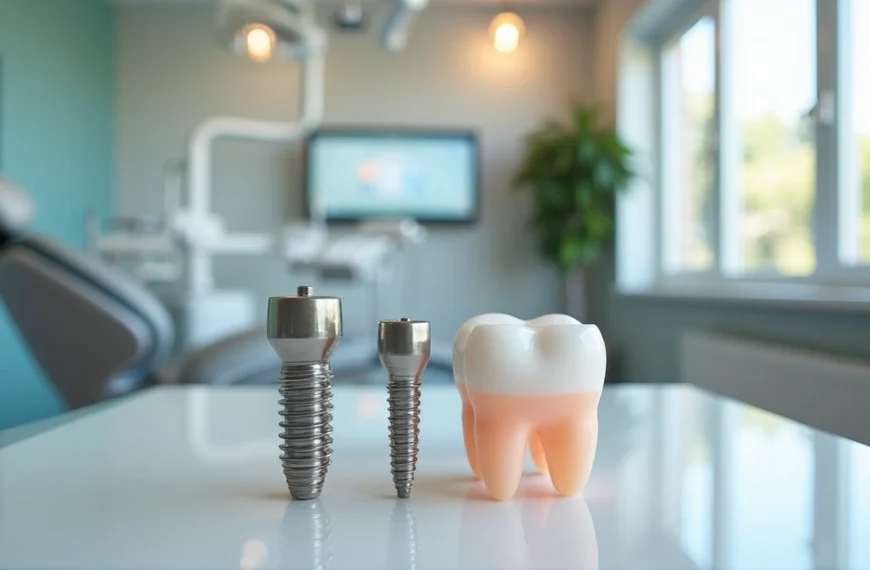Dental implants are a great way to replace missing teeth and help restore the look, feel, and function of your smile.
But before you decide on getting an implant, it’s essential to understand the pros and cons. So, you can make an informed decision that’s right for you.
In this blog post, we will explore the advantages and disadvantages of dental implants.
Let’s get started!
What are Dental Implants?

Dental implants are a revolutionary solution for replacing missing teeth and restoring your smile. They are artificial roots, typically made of titanium.
These roots are surgically placed into the jawbone to provide a secure foundation for replacement teeth. It allows the dental implant to fuse with the jawbone, creating a solid and stable structure for the replacement teeth. The result is a beautiful, natural-looking, functioning set of teeth that can last a lifetime.
With the help of dental plate, you can feel confident and secure in your smile once again.
The Pros of Dental Implants: Weighing Your Options
Implants Mimic Natural Teeth

Dental implants can provide a beautiful, natural-looking result. Implants replicate the look and feel of natural teeth. Unlike dentures and bridges attached to existing teeth, dental plate are independent structures firmly anchored into the jawbone.
It makes them feel more like natural teeth when biting or chewing. Implants also don’t require the removal of healthy adjacent teeth, as is often the case with bridges. The outcome can provide a more secure, natural look.
Enjoy Whatever You Want to Eat, Bite, and Chew

Dental implants mean you can continue enjoying all your favorite foods without restrictions. Traditional dentures can be uncomfortable and make it difficult to eat certain foods. But with dental plate, you can take a bite out of anything you like!
They give you the stability and strength to bite, chew, and eat whatever you want without fearing your teeth slipping or shifting. Implants also restore the normal pressure on your jaw, which is essential for chewing. It means that you cannot only eat what you want but also enjoy it just like you would with your natural teeth.
Taking Care of Implants Is Easy

Dental implants are a great choice if you’re looking for an easy-care option. Unlike other dental restoration methods, implants don’t require much extra effort. Once they’ve been placed, you can brush and floss your teeth just like natural teeth.
No special instructions are necessary!
The implant acts as a root for the crown placed on top, so there is no risk of decay or shifting. In addition, implants are more resistant to staining than natural teeth. Your implants can last a lifetime with good oral hygiene practices and regular check-ups at the dentist.
The Cons of Dental Implants: Weighing Your Options

Failure of Dental Implants Is Possible
When considering dental implants, one of the risks to take into account is that they can fail. It is an infrequent occurrence that can happen due to several factors. These factors include inadequate bone or soft tissue support or poor positioning of the implant.
If the implant fails, then the restoration on top will not be able to be used. You will need to replace the implant with a new one, and the process will start again. Therefore, it’s essential to ensure you are aware of this possibility when considering dental plate and consult your dentist to discuss your risk factors.
Restorations on Top Can Wear Out

Dental implants may be the most reliable and long-lasting solution for missing teeth. But the restoration on top of the implant can wear out over time. While the titanium post is incredibly durable and resistant to decay, the restoration is. Even if your dental plate last forever, you may need to replace the repair at some point.
It’s important to understand that this wear can vary greatly depending on how well you take care of your implant and the restoration. You can minimize the wear on your restoration by brushing and flossing regularly and avoiding hard and sticky foods.
However, regular checkups with your dentist are necessary to identify any issues before they become serious.
Time-Consuming Process

Dental implant treatment can be a lengthy process, depending on your situation. In some cases, the entire process of planning and preparing for. Placing an implant can take many months to complete. During this time, you may have multiple appointments with your dentist. It’s important to understand that although the process might seem lengthy. It’s necessary to ensure that your dental implant is placed securely and accurately.
Additionally, while waiting for your implant to heal, you may have temporary teeth replacements like bridges or dentures. These quick solutions can also take some time to adjust to. So be sure to discuss your concerns with your dentist before beginning treatment.
The Cost of Dental Implants Is High

It’s no secret that dental implants are a more expensive option than traditional dentures and bridges. The cost of dental plate can be anywhere from several hundred to several thousand dollars. Its cost depends on the complexity of the procedure and the number of implants needed.
Additionally, insurance may not cover the total cost of the procedure, leaving you with a hefty bill to cover out of pocket. It might be a prohibitive factor for those who need access to financial resources.
Conclusion
Dental implants are an incredibly beneficial option for those looking to restore their smile and improve their oral health.
While the cost of dental implants may be intimidating, the long-term results can be worth it in terms of longevity, ease of care, and natural-looking results. Ultimately, you must weigh your options carefully and decide which solution best suits your needs.
No matter your choice, you will be well on your way to a happier and healthier smile.














![No Win No Fee Lawyers: The Hidden Truth About Settlement Cuts Legal representation through no win no fee lawyers gives clients a way to fight cases without paying anything upfront. Many clients don't know that these services take a big chunk of money after winning the case. Lawyers usually take 25% to 40% of what you win as their contingency fee. The amount lawyers take from settlements can add up fast. A $100,000 settlement means your attorney gets $30,000 if they charge a 30% fee after winning your case. Your solicitor's cut might be £10,000 from a £30,000 compensation award, based on your agreement percentage. This payment model stays pretty much the same for no win no fee lawyers in different places, though percentages can change. This piece breaks down what you need to know about contingency fee deals. You'll learn about standard fee ranges, extra costs beyond the basic fee, and times when this payment setup might not work in your favor. Smart clients should think over these money matters before signing up with a lawyer to make better choices about their legal help. What No-Win No-Fee Really Means Image Source: Express Legal Funding A no-win no-fee arrangement, also called a Conditional Fee Agreement, changes the way people get legal help. This payment approach removes the need to pay legal fees upfront and creates a partnership between clients and their attorneys. How contingency fees work No-win no-fee agreements are based on contingency fees. Lawyers get paid only when they win compensation for their clients. Most lawyers take between 25% and 40% of the final amount, based on how complex the case is and where it's filed. Lawyers take their cut after winning the case. To name just one example, see a case where a lawyer wins £30,000 in compensation with a 33% fee - they would receive £10,000. On top of that, some law firms use sliding scales where they charge less for quick settlements and more if the case goes to trial. The law requires a written agreement before any work starts. This paperwork spells out the lawyer's percentage, what costs you'll need to cover, and other key details. What happens if you lose the case The meaning behind "no-win no-fee" is clear - losing your case means you won't pay your lawyer anything. All the same, you should know about a few money-related details. You won't owe your lawyer when you lose, but some deals might make you pay for court fees, expert witnesses, or other case expenses. The other side could also ask you to pay their legal costs. Many lawyers suggest getting "After Event" insurance to protect their clients. These policies cover any costs if you lose your case, which makes the no-win no-fee setup much safer. Why lawyers offer this model Lawyers want to make legal help available to more people, so they offer these payment plans. This setup helps people who don't have much money take legal action when they have valid claims. The payment structure motivates lawyers to work hard. They only get paid by winning cases, which pushes them to get the best results possible. Lawyers carefully assess each case before taking it on a no-win no-fee basis. They usually accept cases that have a good chance of winning, since they put in lots of time and resources without any guaranteed payment. The Real Cost: How Much Do Lawyers Take from a Settlement Image Source: Greiner Law Corp. The true cost of no-win no-fee legal representation becomes clear once we look at contingency fees. Many clients feel surprised to see a big chunk of their settlement checks going to their attorney's fees. Typical percentage ranges (25%–40%) No win no fee lawyers typically ask for 25% to 40% of the total settlement amount. Personal injury attorneys usually take 33.3% (one-third) of the awarded compensation[101]. Lawyers and clients agree on this percentage before any work starts on the case. Several factors shape the final percentage. Your chances of winning, case complexity, and the work to be done play key roles in determining the attorney's cut. Some areas have laws that cap the maximum contingency fees for specific types of cases. Sliding scale based on case complexity Law firms often use a tiered fee system that changes with the case stage and complexity. This scale rewards quick settlements while paying attorneys fairly if more work becomes needed. The fee might start at 30% if the case settles before lawsuit filing. This number could climb to 35% after filing or reach 40% if the case goes to trial. Law firms often group cases by complexity: 10%-20%: Simple cases with straightforward settlements 25%-35%: Typical personal injury cases 35% and above: Complex cases requiring extensive resources Examples of payout breakdowns These ground examples show how fees affect settlements: A $15,000 settlement with a 33.3% contingency fee.pdf) puts $5,000 in the attorney's pocket, leaving $10,000 for the client. Similarly, from a $100,000 settlement with a 33% fee, the attorney gets $33,000 while the client receives $67,000[102]. Complex cases tell a different story. A $100,000 settlement with a 30% fee plus $5,000 in extra costs leaves $65,000 for the client after all deductions. These fees substantially change the client's final payout. Hidden Costs You Might Not Expect Image Source: Nelson Personal Injury Lawyers Beyond percentage-based fees, clients often feel surprised by extra costs that can reduce their final compensation by a lot. These hidden costs show up in the fine print of no-win no-fee agreements. You should think over these details before signing. Court filing and expert witness fees Legal proceedings come with unavoidable court filing fees. These charges differ by jurisdiction. They usually range from $30 for small claims to several hundred dollars for complex civil lawsuits. Expert witnesses can be expensive, with hourly rates ranging from $150 to $1,000 based on their credentials and testimony complexity. Expert witnesses charge more for court appearances than consultation work because of added pressure and prep time. Clients might still need to pay experts for their prep work even if the case settles before trial. Medical report and investigation costs Medical documentation is a vital part of many legal claims. These costs include fees to release medical records, create specialized reports, and prepare documents. Investigation costs cover evidence gathering, police reports, witness interviews, and other fact-finding work needed to build a strong case. Of course, some firms say they'll cover these expenses upfront, but clients don't completely avoid these costs. When these costs are deducted from your compensation Law firms take these expenses from the settlement amount before they calculate their percentage fee, though each firm handles this differently. Some lawyers subtract these costs after figuring out their contingency fee, which changes how much money clients end up with. Most firms pay case-related costs during the process and get their money back from the settlement. The defendant usually pays most simple legal costs and disbursements in successful cases, but not always everything. Insurance protects clients from costs in unsuccessful claims at many law firms, but this protection isn't guaranteed. Clients should review their agreements carefully since they might still need to pay specific expenses even if they lose their case. When No-Win No-Fee Might Not Be the Best Option Contingency fee arrangements give many people access to justice. However, this payment model doesn't always work in a client's best interests. Knowing these limitations helps clients make better decisions about their legal representation. Cases with unclear liability Lawyer no win no fee arrangements work best in cases where fault is clear. We assessed the probability of success before taking contingency cases. Lawyers might turn down cases if there isn't enough evidence of the other party's negligence or if liability isn't certain. Cases with multiple responsible parties create more challenges. The situation gets complicated fast when several parties share liability. Lawyers are less likely to take these cases on contingency. They need to be confident they can prove the other party's negligence before accepting a case. Low-damage or low-payout claims Small claims often don't work well with the contingency model, even with real injuries. Cases that have minimal injuries or limited financial damages might not bring enough compensation to cover legal costs. The potential settlement needs to be big enough to pay for investigations, witness interviews and court fees. Personal injury lawyers often turn down cases where the "compensation potential" is too small. This doesn't mean the claim isn't valid - it just means the economics don't add up for a contingency arrangement. Situations where hourly billing may be better Hourly billing has clear advantages in certain cases. Clients see exactly what they're paying for - every hour worked and task completed. This model works well for cases that need lots of attention but don't have clear financial outcomes. Complex litigation with opposing parties works better with hourly billing and a retainer fee. Clients have more control over their case and don't feel pressured to settle quickly. Cases that need extensive preparation but have uncertain outcomes fit the hourly model better. Lawyers can spend the time needed without worrying about contingency limits. This approach often leads to better representation, especially for complex legal issues that need special expertise. Conclusion Understanding the Full Picture Before You Sign No-win no-fee arrangements offer legal representation without upfront costs. Of course, this seems attractive at first glance. In spite of that, you need to think about how these agreements can affect your final compensation. Legal fees usually range from 25% to 40% of your settlement - but that's just the start. You'll face more deductions like court filing fees, expert witness costs, and charges for medical documentation. What looks like a "free" service ends up taking a big chunk of your compensation to cover legal expenses. These arrangements work best in specific situations - cases with obvious liability, substantial damages, and solid evidence. If you have a low-value claim or complex liability issues, traditional hourly billing might serve you better. Without doubt, you should ask for clear explanations of all possible costs before signing anything. Read the fine print closely, especially when you have to deal with expenses in unsuccessful cases. Ask to see sample settlement breakdowns that show all deductions. This helps you picture what you might actually take home. Your choice to go with a no-win no-fee arrangement depends on your situation. This model helps if you don't have money to pursue valid claims. But if you have a strong case and enough funds, other fee structures might let you keep more of your compensation. Whatever payment model you choose, knowing exactly how much lawyers take from settlements helps you make better decisions. This knowledge lets you approach legal representation with real expectations and better control over your money. FAQs Q1. What percentage of a settlement do no-win no-fee lawyers typically take? No-win no-fee lawyers typically charge between 25% to 40% of the final settlement amount as their contingency fee. The exact percentage often depends on the complexity of the case and the stage at which it is resolved. Q2. Are there any hidden costs in no-win no-fee arrangements? Yes, there can be additional costs beyond the lawyer's percentage fee. These may include court filing fees, expert witness costs, medical report expenses, and investigation costs. These expenses are usually deducted from the settlement amount before or after the lawyer's fee is calculated. Q3. What happens if I lose my case in a no-win no-fee arrangement? If you lose your case, you generally won't have to pay your lawyer's fees. However, you might still be responsible for certain expenses like court costs or the opposing party's legal fees. Many lawyers offer insurance to protect clients from these potential costs in case of an unsuccessful claim. Q4. When might a no-win no-fee arrangement not be the best option? No-win no-fee arrangements may not be ideal for cases with unclear liability, low-value claims, or complex legal issues requiring extensive preparation. In these situations, traditional hourly billing might be more appropriate and potentially more cost-effective for the client. Q5. Can I negotiate the percentage a lawyer takes from my settlement? Yes, the contingency fee percentage is often negotiable. It's typically agreed upon and formalized in writing before the lawyer begins working on your case. Don't hesitate to discuss the fee structure with your lawyer and ask for a detailed breakdown of potential costs and deductions.](https://consumersweek.com/wp-content/uploads/2025/06/No-Win-No-Fee-Lawyers-The-Hidden-Truth-About-Settlement-Cuts-870x570.webp)

